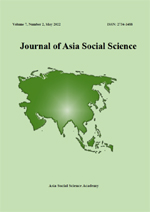How Rule of Law Complements Economic Development
- 아시아사회과학학회
- Journal of Asia Social Science
- Vol.7 No.2
-
2022.051 - 12 (12 pages)
-
DOI : 10.51600/jass.2022.7.2.1
- 11

The rule of law and legal systems are seen as a precondition for long-term economic growth. The weakness of the legal system in the developing world is seen as a major problem in economic growth. Therefore, strengthening the rule of law and legal systems is required for the economic development of the developing world. The rule of law, on the other hand, is a multidimensional concept that consists of a variety of separate components ranging from personals security, property protection, government accountability and control of corruption. The rule of law is required at the National level to create a good environment for generating sustainable livelihoods and reducing poverty. It also promotes development by empowering individuals and communities, assuring access to justice, ensuring due process, and establishing remedies for human rights violations. More so, security of livelihoods, shelter, tenure and contracts can enable and empower the poor to defend themselves against violations of their rights. Legal empowerment promotes and improves economic prospects in addition to providing legal remedies. For the achievement of sustainable development goals, all human rights, including economic, social, and cultural rights, as well as the right to development, must be protected by the implementation of the legal system of the country. Further rule of law may provide a legal framework, contractual clarity, and conflict resolution process that aid economic growth and development.
1. Introduction
2. What is rule of law
3. Rule of law and economic growth
4. Media and civil society rule in law and economic development
5. Conclusion
References
(0)
(0)